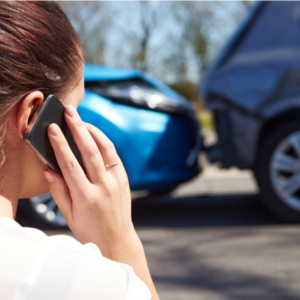 People typically associate driving a car with going to work, running errands, dropping the kids off at school, or taking a much-needed vacation. However, driving is one of the most dangerous activities that millions of people do on a daily basis. According to a report from the Canadian Transportation Safety Board, there were 160,000 accidents in 2017, resulting in over 2,800 fatalities nationwide. A similar report revealed that Halifax has the highest collision rate of 7.9 collisions per 100 cars.
People typically associate driving a car with going to work, running errands, dropping the kids off at school, or taking a much-needed vacation. However, driving is one of the most dangerous activities that millions of people do on a daily basis. According to a report from the Canadian Transportation Safety Board, there were 160,000 accidents in 2017, resulting in over 2,800 fatalities nationwide. A similar report revealed that Halifax has the highest collision rate of 7.9 collisions per 100 cars.
Most of us do our best to follow the rules of the road, but statistics indicate that the average driver will make a car insurance claim once every 17.9 years. This means that if you get your driver’s license at 16 years old, you will be involved in at least three collisions over your lifetime.
A car accident can be a scary experience, especially if you are injured by the impact. Whether it’s a fender-bender or a serious collision, knowing the steps to take after a car accident will help ensure everyone stays safe and that you receive the benefits you are entitled to.
Check Yourself for Injuries
Following a collision, you should first assess the scene to determine if it is safe to move your car out of the way from oncoming traffic. If it is not possible to pull over to the side of the road, or you have been seriously injured after being in a car accident, turn your hazard lights on and stay inside your vehicle.
The next step is to check yourself for injuries. Be extremely cautious because not all injuries are visible, and some don’t present themselves until days or weeks following a motor vehicle collision. The body releases high levels of adrenaline after a car accident. Adrenaline is a natural hormone produced during the body’s fight or flight response. However, one of the most important functions of adrenaline is blocking the recognition and sensation of pain. It is very common for people to feel fine directly following a car accident and wake up the next day in severe pain from injuries sustained in the crash.
Common car accident injuries
- Whiplash
- Head injuries and traumatic brain injuries
- Spinal cord injuries
- Broken bones
- Lacerations (cuts)
- Internal bleeding
- Contusions (bruising)
- Joint and soft tissue damage
- Burns
Contact the Police & 911
Even if you think that you are not injured, call 911 as soon as possible to get examined by a medical professional. This also ensures that you have an official medical report for an insurance claim. You should also book an appointment with your doctor to discuss the treatment and recovery for your injuries. Be sure to comply fully with your doctor’s recommendations.
In Nova Scotia, a police report is required by law if there is more than $2,000 worth of property damage to either vehicle. If you intend to file a claim or personal injury lawsuit, a police report verifies the details of the accident. If the responding officer asks you questions at the scene, answer honestly but do not apologize or admit responsibility of any kind. Insurance companies may use your statement as an admission of fault and deny your claim.
Collect Contact Information
Typically the investigating officer will collect information from all parties involved in a car accident. However, recording this information yourself is never a bad idea. Do be mindful of limiting your conversation with the other driver involved to only the necessary exchange of contact and insurance information. Just like watching what you say in the police report, the other driver can (and most likely will) relay your conversation to their insurance company that may use your words against you.
What information to collect from the other driver after a car accident
- Full name and contact information
- Insurance company and policy number
- Driver’s license and license plate number
- Vehicle make, model, and colour
If there are witnesses, you should gather their contact information as well. The insurance company or car accident lawyer may need to contact witnesses regarding your claim or personal injury lawsuit.
Gather Evidence
Gather as much information about the accident as you can. If you can, take photos and videos of the scene and your injuries. Be sure to capture all angles of the accident and resulting damage. It’s better to have too much information than not enough.
List of information to record at the scene of a motor vehicle accident
- Date and time of the accident
- Location of the accident
- The direction you and the other driver were travelling
- Photos of the damages to all vehicles involved
- Photos of your injuries
- Record a video or take notes of how the crash happened
- Document the weather
- The name, badge number, and contact information of the responding officer
Notify Your Insurance Company
A car accident claim can take time to process, delaying your access to benefits and treatment for your injuries. A good rule of thumb is to initiate the claims process as soon as possible following a car accident. If your injuries or other responsibilities prevent you from filing a claim right away, you do have some flexibility in how long it takes you to notify your insurance company.
Your policy will determine how long you have to file a claim with your insurance provider. Typically, you need to notify your insurance company within seven days of when the car accident occurred. You must file an accident benefits claim within 30 days of the accident. If your claim for accident benefits is denied, you have two years to take action against the insurance company.
If you are filing a claim through the other driver’s insurance, you should let your claims adjuster or attorney handle this interaction. The primary goal of the other driver’s insurance provider is to pay you as little as possible or deny your claim entirely. If they call you, and they will, you are under no legal obligation to talk to them.
Contact an Experienced Car Accident Lawyer
If you are injured in a car accident or unsure of what benefits you are entitled to, consult a car accident lawyer before filing an insurance claim. While your insurance provider has a duty to act in your best interests, they will not advocate for the treatment and compensation you deserve the way a personal injury lawyer will.
Your attorney can advise you on what statements to disclose to your insurance provider, how to make sure you are fully compensated for damages to your vehicle, and how to ensure that you receive the best medical treatment available.
Stay Off Social Media
It may seem natural to post your recollection of events in the aftermath of a car accident across your social media channels. Remember that insurance companies will look for any reason to deny your claim or reduce your settlement offer. You may think uploading a picture of a family barbeque is innocent.
Still, insurance companies can manipulate the context of your social media posts after an accident to jeopardize your claim. They may also use posts from weeks or years before the accident to determine your character, the type of risks you took leading up to the accident, and any pre-existing injuries that could be argued for causing your current pain.
If possible, do not post anything or send any private messages on social media until your car insurance claim or personal injury lawsuit is resolved.
Hurt in a Car Accident? Learn About Your Legal Rights Now.
While the details in auto insurance policies vary between providers and the province you live in, the Nova Scotia Insurance Act outlines a standard form policy. The four main sections of the Nova Scotia standard form auto policy explain the coverage and benefits you are entitled to as an insured driver.
Knowing what to do if injured in a car accident and dealing with the claims process can be overwhelming, especially when you should be focused on recovering. The team of personal injury lawyers at Valent Legal has decades of experience advocating for car accident victims, and we are here to help you through this difficult time.
We offer a free, no-obligation consultation where we will review the details of your claim and advise you of your legal rights and options. If you choose to move forward with our legal services, we will build the best claim possible to get you the financial compensation you deserve. Our law firm works on a contingency fee basis. This means that you will not be charged to retain our attorneys until after your case is settled.








